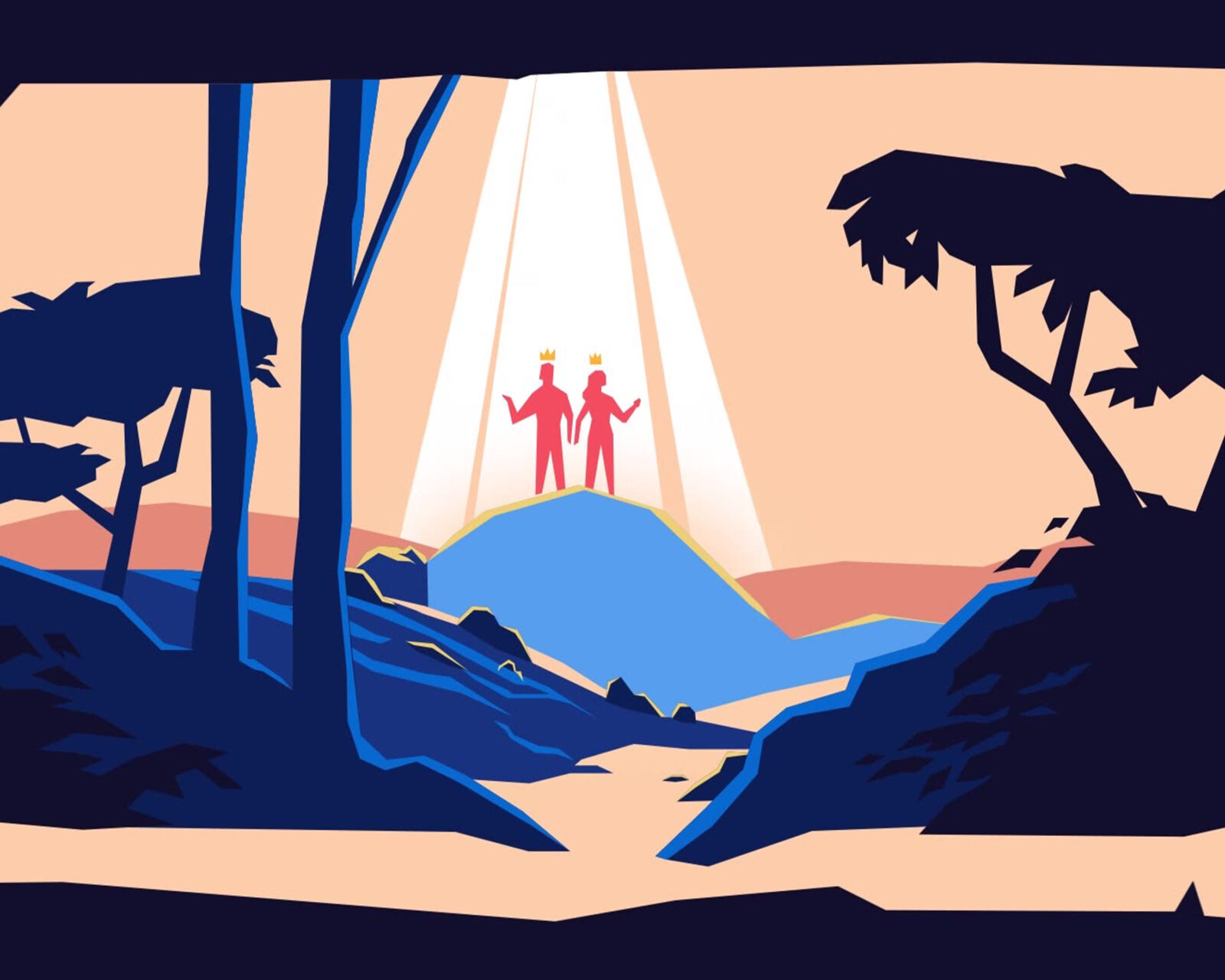Proclamation
Searching for our origins

All people experience desires — the need for meaning, the desire for love, happiness, truth, beauty. These are deep desires that are never fully satisfied in this life and are so universal that we can even say they are spiritual desires.
Proclamation

Connection

Podcast

Emily: You know, I realized recently that kids and philosophers are annoying in the same beautiful way.
Edmund: Okay. Wait, you got to explain that to me. What do you mean?
Emily: My 7-year-old nephew recently asked me why do puppies turn into dogs? So I explained how they grow up and then he asked again, well, why? And then he just kept asking why to every answer that I gave him endlessly.
Edmund: Okay. I get it. Yeah. I have a friend studying philosophy in college who is just like this.
Emily: Exactly. Kids and philosophers have a lot in common. They ask why about things most people don’t sit around thinking about in their day-to-day life. One of the hardest questions in the world is why?
(On screen “Why?”)
Edmund: Oh yeah, I get that. I mean, philosophy is different in that way from science. Science is super helpful to answer questions like how (How?) or what (What?). But it can’t really answer this hard question: why? Or these types of questions, why am I here? Why does anything exist? These are questions of meaning and purpose. And they’re deeply human questions.
Emily: Yeah, I mean, who hasn’t had a mini existential crisis in their life.
Edmund: Yeah, exactly. The Catechism explains in paragraph 27: The desire for God is written in the human heart, because man is created by God and for God. And only in God, will he find the truth and happiness he never stops searching for.
(27 The desire for God is written in the human heart, because man is created by God and for God. […] Only in God will he find the truth and happiness he never stops searching for.)
Emily: So we’re always going to ask these big questions because we have that desire for truth and happiness.
Edmund: Throughout history people have always tried to answer these deeper questions with philosophy and religious beliefs and practices. In fact, you can say that humans are religious by nature.
Emily: Okay. But how is that possible? I know a lot of people who would say that they are not religious.
Edmund: Well, the desire for God is written on every human heart.
Emily: Heart? Like, what does that mean? Just our emotions?
Edmund: The Catechism uses the term “heart” in the same way that the Bible uses the word heart. “The heart is the dwelling-place where I am. The heart is a place to which I would draw. The heart is our hidden center beyond the grasp of our reason.”
That’s where we experience these deep desires, the deep need for meaning, the desire for love, happiness, truth, beauty. These are deep desires that are never fully satisfied in this life. This is why we can say these are deep spiritual desires. It’s so universal that we can say we’re fundamentally a religious creature. It’s like God hid this search for meaning and happiness in our hearts as a clue, or an invitation to look for him. And people have always tried to answer these questions that all ultimately, whether you know it or not point back to God.
Emily: Okay. So we all have these desires, but can they really lead everyone to God?
Edmund: The Catechism says: God never ceases to call every person to seek him so as to find life and happiness. But this search for God demands of us every effort of intellect, a sound will, an upright heart, as well as the witness of others (List with boxes: Intellect, Sound Will, Upright Heart, Witness of Others) who teach us to seek God. It’s important for us to keep this in mind as we talk about ways we can come to know God. These are called “proofs”. (Proofs)
Emily: Proofs? Like proof that God exists?
Edmund: Yes. But proofs here means strong and convincing arguments for God. We can find the arguments in the physical world and by looking inward at ourselves.
Emily: Yeah. When I look around the world, especially in nature, I can see how it’s possible to come to an idea of God. And I guess that’s just using my reason alone. I look at the visible world and get the concept of God.
Edmund: Human beings can observe, make connections and rationalize the world around them. Can cats do this? Nope. Can dogs? No, no matter how smart they are. As human beings, we can literally reflect upon our own thoughts. We can reason out things in a way that other creatures cannot. In that way we look around at the world and ask why? And wrestling with those questions brings us to the notion of a God who is bigger than everything we can do. Which is why we can say the desire for God is uniquely written on the human heart.
Emily: Okay. So what makes us human is that we ask why, as we make sense of the world, that God has created around us.
Edmund: We’re a strange creature. We desire truth and beauty, and we have a sense of right and wrong, and free will. We have a conscience and infinite longings. We ask questions about God’s existence and we can perceive these as signs that we have a spiritual soul. Our souls can only have its origin in something infinite, immaterial outside of time. God.
Emily: So because we have these longings and free will, that means we’re created by God?
Edmund: Yes, you got it. The desire for God is written, imprinted on every human heart. We see that desire play out in the questions we ask about the world and ourselves and even the fact that we ask these questions implies that there might be a God. God is partially revealed in the world and in the human person. For that reason, it’s called natural revelation (natural revelation) since we can see God revealed in the natural world and in human nature. Because we’re created by God, we have this capacity to know that he’s behind creation just from reason alone.
Emily: I feel like there’s a “but” coming. If we know God by reason alone, why doesn’t everyone know him? And why do people of faith say that they believe in God? (“I believe in God”)
Edmund: That’s because human reason is not perfect. There are challenges to overcome. We are imperfect, we have flaws and we can convince ourselves of a lot of different things.
Emily: So we have the capacity to come to understand God, but it’s going to be a challenge.
Edmund: Yes. Which is why we find ourselves in a situation where God desires to reveal himself to us, and we have difficulty finding him. But God wants to help us know him and God wants to reveal more about what we’re created for and what he is really like.
Emily: What else does God want to reveal?
Edmund: Oh, a lot. God desires to give us even more than what we can come to know by human reason alone in natural revelation. The desire for God is written in the human heart and we can see that desire play out when we ask “why” about our lives and the world, like kids and philosophers do.
But God wants to come to meet them, us, everyone, and show us even more.
U.1 — CCC 1-25

God has a beautiful plan for your life. He created you with a purpose: to know and love him.
WatchU.30 — CCC 1716-1729

The language in the Beatitudes might seem counterintuitive but the grace that comes through the experience blesses us, and this is what leads to true happiness.
WatchU.29 — CCC 2052-2082

By giving us the Ten Commandments, God clearly defined what actions are sinful and evil so that we can turn away from sin and choose the path of love and…
WatchU.28 — CCC 1949-2051

Through grace, we can respond to God’s invitation to be justified through Jesus and the power of the Holy Spirit.
WatchBy submitting this form you consent to receive emails about Real+True and other projects of OSV.